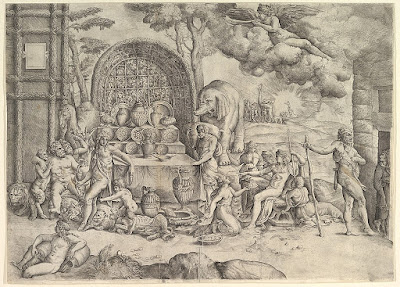You can find the updated version of the story
here.
I awoke from my dream in a mysterious place filled with the stench of death. There were souls wondering the plagued ground and they were searching for someone to smother and take their life. However, I did not fear such incompetent creatures. "I am the Venerable Sun Wu Kung!" I yelled this as I walked past the creatures. I did not and I will never fear such foul creatures. I am Heaven's equal, and I did not forget that I was the chosen one to lead my people. So, I ventured forward into the pitch-black night and stopped when I came upon the gates to a very large and ominous city.
I soon realized where I had wondered. The guards at the gate informed me that I was now in the realm of death known as the Nether World. However, it did not take the words of the guards for me to realize I had been led to the realm of the forsaken and dead. I pulled out my staff and lengthened it to ten feet. The guards were frightened by this act of aggression, and I did not hesitate. I quickly struck down the guards and gained entrance to the city.
I stormed through the city without regard for the patrons. "I am the Venerable Sun Wu Kung!" I yelled this through the streets as I was searching for those foolish enough to bring me to such a disgraceful place. I was met by a party of 10 men and their bodyguards. They claimed to be the ten princes of the Nether Realm. I was not amused with their titles. "You are no princes! You are weak and feeble spirits, and I will not take orders from you fools!" I yelled this at the princes as they clamored backwards in fear. I ordered them to bow in my presence. They were very quick to oblige to my demands and knelt before my feet. They were scared, and I planned to take full advantage of my position of power.
The princes spent some time trying to appease me. They were afraid that I would bring harm to them and their people. I knew what I was fully capable of doing, so I showed them mercy. "Bring me the Book of Life and no harm shall come to you!" I yelled at them to do so with urgency. They did not hesitate in bringing me the book. I thumbed through the pages until I came across my name and the name of my people. Once I found the names I marked through the day of our predetermined deaths. I freed my people of any fate that was going to become of them.
However, I knew that there was still more to achieve on earth and in the heavens. So, I quickly made my way out of the city and awoke from my dream. I was back with my people on earth. I told them of the good news and my astoundingly easy victory. We celebrated with a giant banquet that night. I had secured the lives of my people, and we all knew it was a great time to rejoice.

Author's Note: The story that I retold was sourced from The Monkey King Unit. The Monkey King, Sun Wu Kung, is a popular figure from Chinese folklore. Sun Wu Kung was born as a stone ape. He possessed the powers of both the earth and the heavens. His birth place was high on a mountain top, and the mountain had taken in powers from all of the elements. This gave him his natural abilities and powers that far exceeded those of any man. Sun learned the secrets to immortality during his travels. He possessed the ability to shape-shift and walk amongst the clouds. The specific account I retold came from Sun's adventure to the Nether World. I kept most of the details of the story fairly similar. I told my version in first-person. I felt that this makes a more detailed and engaging story than the traditional third-person perspective. I also changed a few small details here and there to add some variety to the story and put my own mark on the retelling.
Bibliography: "The Ape Sun Wu Kung" from The Chinese Fairy Book by R. Wilhelm and translation by Frederick H. Martens. Source: UnTextbook

























